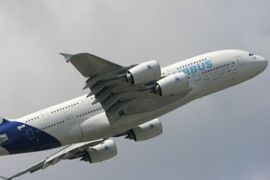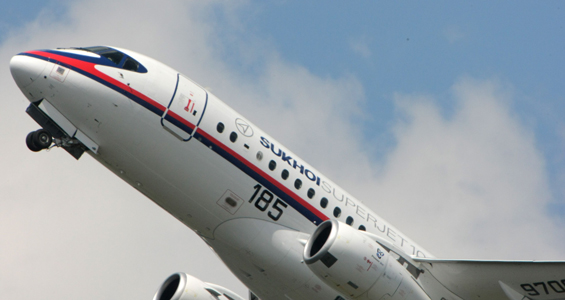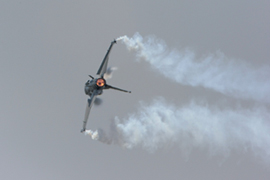Respite from aviation’s dark clouds
‘Moderate optimism’ for hard-hit industry at Paris air show.

 |
| Fighter jet maker Sukhoi unveiled its Superjet 100 passenger plane at the air show [AFP] |
From dark skies to bright sunshine, the mood seemed to lighten straight away.
People were smiling even if there was not much to smile about.
But I suppose this is France and the hundredth anniversary of Le Bourget, now the biggest air show in the world.
One of the happiest men seemed to be the chief executive of Turkish airlines, Temil Kotil.
Perhaps it was the graphs he showed me that brought such joy – they were full of a growth growth growth! Profits, passengers – pretty much everything.
‘Better than anticipated’
Asked if he was at all worried about the global recession, he said he accepted that “there is crisis in the airline business”.
| In video |
|
|
“But for Turkish airlines we are not concerned too much. It looks strange but that’s correct. Why? Because every day we are opening new routes, we are getting new passengers.”
There were also some surprisingly positive bits of news from Airbus. It sold 16 A321 planes to Vietnam Airlines just a day after Qatar Airways bought 24 A320s in a deal worth $1.9bn.
“I’d say the mood is somewhat better than anticipated,” said Charles Alcock, editor of Aviation International News.
“It’s no secret that the last six months have been pretty wretched for the whole industry. We have seen a steep decline in orders but actually in the first 24 hours of this show we have seen some grounds for moderate optimism.”
But Airbus’s rival, Boeing, had no such good news. Its executives say the industry’s prospects were robust but it seems to be lagging behind with no orders so far.
Both will be looking back nostalgically to the Farnborough show last year when they received hundreds of signatures.
“The airline industry came into this recession on the back of three or four years of utterly exceptional growth,” said Charles Alcock.
“And the financial crisis hit in an incredibly dramatic way so it’s like a fast moving vehicle that suddenly has to put on the brakes and there’s going to be some damage when they have to slow down.”
‘Breakthrough product’
That is why it was so brave of Russian firm Sukhoi, better known for its fighter jets, to unveil the Superjet 100 – the nation’s first passenger plane since the days of the Soviet Union.
 |
| One observer said orders on the first day had brought some optimism [AFP] |
It has been showing off the aircraft in daily displays at the show and it has worked.
The boss of Sukhoi’s civil aviation wing, Victor Soubbotin, told Al Jazeera the orders were coming in fast.
Lessor Avialeasing firmed up an order for 24 aircraft in a deal worth $715m. The total number of firm orders was 122.
“This is a breakthrough product that will make Russia able to compete in the International aviation market,” a very pleased Soubbotin said.
“We should be proud that Russia made this plane.”
But what will that market look like in the coming months?
Gloomy outlook
The outlook is bleak, according to the International Air Transport Association, the industry’s largest trade group.
The global airline industry has nearly doubled its forecast for losses this year to $9bn.
It also predicted revenue across the industry will fall 15 per cent to $448bn this year, a much bigger decline than after the 9/11 attacks in the US in 2001.
What does all this mean for passengers?
Well, fewer of us are actually flying, but if you are then the impact will really depend on where you are in the world.
Most Western airlines will have to cut routes and park some of their planes for a while which means less choice and potentially higher fares.
I wondered around the 30 vintage planes on display at Le Bourget.
There has been much technological advancement since these old aircraft were in service. But the glitz and the glamour of air travel seems to have gone.
There is a real sense that for now, at least, the glory days of the industry are over.
